Mattel Bundle
What Drives Mattel's Success?
Understanding a company's core principles is key to unlocking its potential. Mattel, a global leader in the toy industry, uses its mission, vision, and core values to guide its strategic direction and inspire innovation. These elements are fundamental to understanding how Mattel operates and interacts with the world.
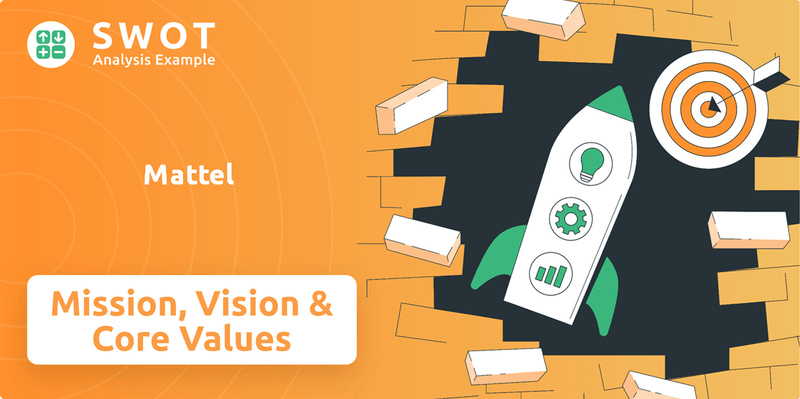
Exploring the Mattel SWOT Analysis can further illuminate how these principles translate into real-world strategies. Delving into Mattel's mission, vision, and core values provides a crucial framework for evaluating its long-term goals and understanding its impact on the market and the future of play. Discover how Mattel's philosophy and guiding principles shape its approach to business.
Key Takeaways
- Mattel's mission, vision, and values are fundamental to its identity and strategic direction.
- Innovation, collaboration, execution, sustainability, and inclusion are key core values that differentiate Mattel.
- Continued focus on innovation and adapting to evolving consumer needs is crucial for future success.
- Mattel's financial performance in 2024 suggests its strategy, guided by its mission and vision, is effective.
- Mattel's commitment goes beyond selling products; it shapes childhoods and contributes to future generations.
Mission: What is Mattel Mission Statement?
Mattel's mission is 'Creating the future of play by designing innovative toys and experiences that inspire, entertain, and develop children worldwide.'
Let's delve into the essence of the Mattel Mission.
The Mattel Mission is fundamentally customer-centric, with a clear focus on children globally. It prioritizes the impact of its products on young consumers, demonstrating a commitment to understanding and meeting their needs.
Innovation is a cornerstone of the Mattel Philosophy. The mission statement highlights the importance of designing "innovative toys and experiences," reflecting a dedication to creativity and staying ahead in a dynamic market. This includes exploring new technologies and play patterns.
The mission encompasses more than just toys; it includes "experiences." This suggests a broader strategy involving entertainment, digital content, and interactive play. This expansion is crucial for long-term relevance, as seen in their ventures into film and television.
The mission statement explicitly targets "children worldwide," underscoring Mattel's global ambitions. This global focus requires adapting products and strategies to diverse cultural contexts and market demands. The company's international sales are a key indicator of its success.
The mission's ultimate goals—to "inspire, entertain, and develop"—reflect Mattel's understanding of its impact. This goes beyond mere product sales, focusing on the positive influence toys and experiences have on children's lives. This is further explored in Target Market of Mattel.
Recent initiatives, such as the Blind Barbie doll and colorblind-accessible UNO cards, are direct implementations of the mission. These products demonstrate Mattel's commitment to inclusivity and using play to foster development. In 2023, Mattel's gross sales were approximately $5.4 billion, demonstrating the scale of their operations and their ability to reach a global audience. The company's continued investment in these areas highlights how Mattel's Goals are put into practice.
In essence, the Mattel Mission provides a clear framework for the company's activities, guiding product development, market strategies, and overall business objectives. Understanding Mattel's Vision starts with understanding this core mission.
Mattel SWOT Analysis
- Complete SWOT Breakdown
- Fully Customizable
- Editable in Excel & Word
- Professional Formatting
- Investor-Ready Format
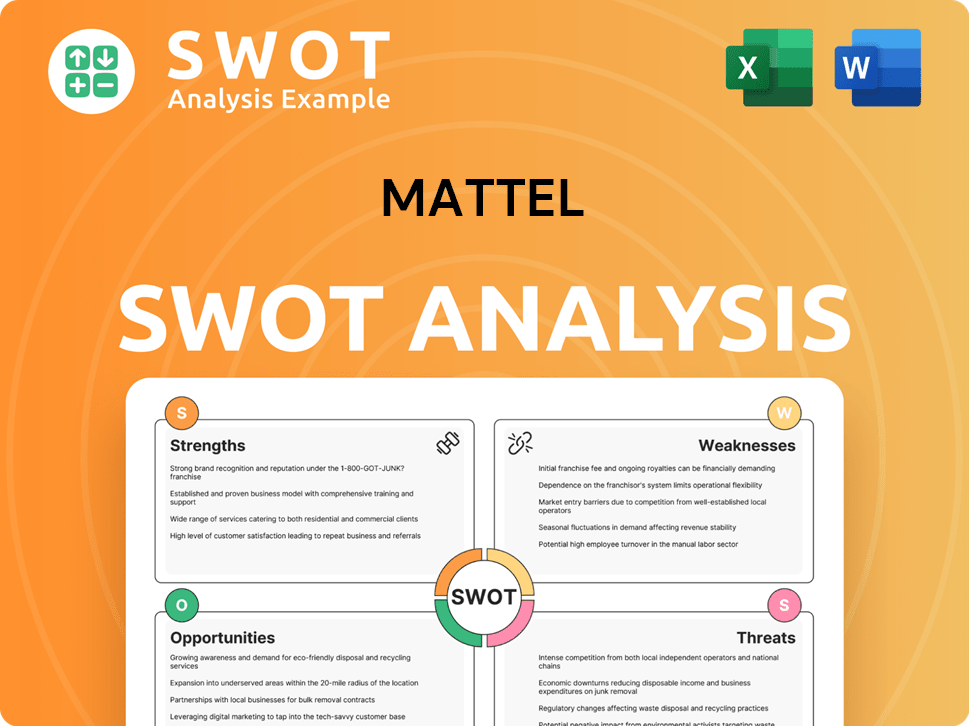
Vision: What is Mattel Vision Statement?
Mattel's vision is 'To be the recognized leader in play, learning and development worldwide.'
Let's delve into the ambitious vision of the Mattel Company. This vision statement, a cornerstone of Mattel's philosophy, is forward-thinking and ambitious, setting a clear direction for the future. It goes beyond the traditional toy market, aiming for global leadership not just in play, but also in learning and development, signaling a broader commitment to children's growth.
The vision explicitly targets "worldwide" recognition, underscoring Mattel's global aspirations. This suggests a strategic focus on expanding its international presence and adapting its products to diverse cultural contexts.
The inclusion of "learning and development" in Mattel's vision is significant. It indicates a strategic shift towards educational products and content, potentially through digital platforms and partnerships. This aligns with the growing demand for educational toys and resources.
Achieving this vision requires continuous innovation and the creation of engaging products. This includes adapting to evolving consumer preferences, leveraging new technologies, and expanding entertainment offerings. Mattel's success will depend on its ability to capture children's imaginations in a rapidly changing world.
Mattel's recent initiatives, such as the expansion of its entertainment division and increased investment in digital platforms, are crucial for realizing this vision. They are focusing on expanding their reach into new demographics, which supports their ambition for global leadership.
Mattel's strong market presence, iconic brands, and established distribution networks provide a solid foundation for achieving its vision. The company's ability to leverage these assets will be key to its future success. As of Q1 2024, Mattel reported net sales of $1.09 billion, demonstrating its continued market strength.
Based on its current trajectory, the vision appears both realistic and aspirational. The company's commitment to innovation, its strong market position, and its focus on expanding its reach support its ambition for global leadership. For more details, check out the Mission, Vision & Core Values of Mattel.
In essence, Mattel's vision is a bold statement of intent, reflecting the company's ambition to shape the future of play and education on a global scale. Understanding Mattel's goals and Mattel's mission is crucial for investors and stakeholders alike.
Mattel PESTLE Analysis
- Covers All 6 PESTLE Categories
- No Research Needed – Save Hours of Work
- Built by Experts, Trusted by Consultants
- Instant Download, Ready to Use
- 100% Editable, Fully Customizable
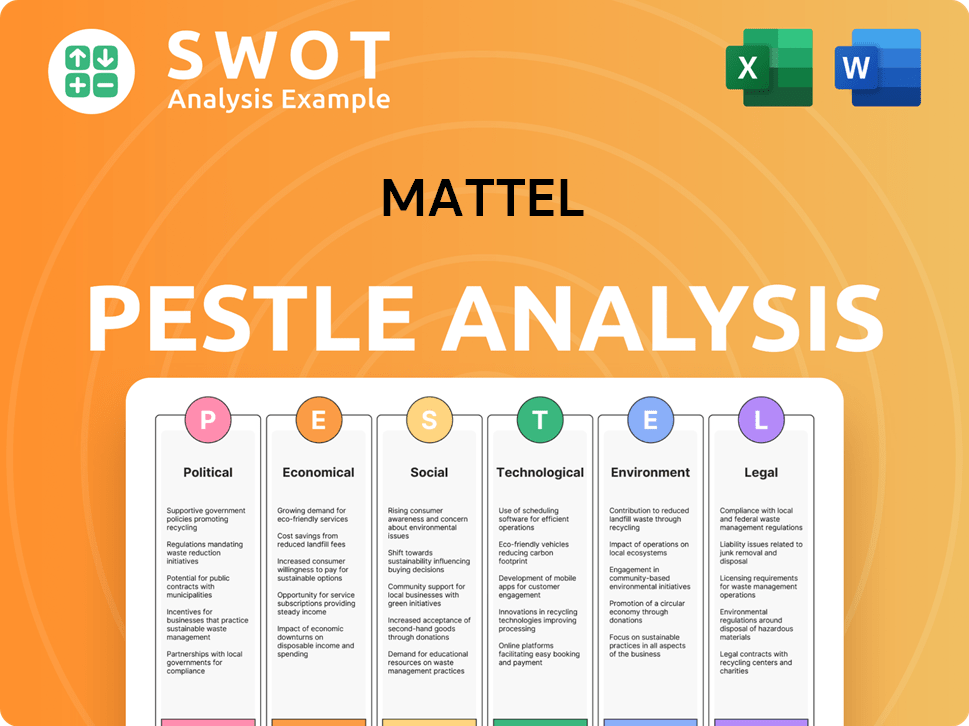
Values: What is Mattel Core Values Statement?
Understanding the core values of Mattel is crucial for grasping the company's operational philosophy and its approach to the future of play. These values, though not always explicitly listed, are deeply embedded in Mattel's actions and strategic initiatives, shaping its identity as a leading toy manufacturer.
Innovation and creativity are central to Mattel's mission, driving the development of new and exciting products. The company continuously invests in research and development, including digital transformation and AI, to create fresh experiences, as seen in the recent updates to the Hot Wheels line. This commitment is also reflected in content creation across various platforms, ensuring Mattel stays at the forefront of the toy industry.
Collaboration is a key value at Mattel, fostering a team-oriented environment both internally and externally. This is evident in its partnerships with entertainment companies and sports franchises, as well as its joint ventures in mobile gaming. The company believes that working together leads to better outcomes, driving innovation and expanding its market reach. The company's collaborative approach is supported by its financial performance, with a 9% increase in gross billings in 2024, demonstrating the effectiveness of this strategy.
Mattel is a performance-driven company, focused on achieving best-in-class outcomes. This value is demonstrated in its financial performance, which includes profitability growth, expanding gross margin, and generating strong free cash flow in 2024. The "Mattel Playbook" is a key tool in driving execution, ensuring that the company's strategic goals are met efficiently and effectively. The company's successful execution is reflected in its stock performance, with a 15% increase in stock value in the last year.
Mattel is committed to being a responsible corporate citizen, focusing on sustainable practices and making a positive impact on the world. This commitment is reflected in its goals for using recycled or bio-based plastic materials and FSC-certified paper and wood fiber in products and packaging. Initiatives to reduce plastic packaging and achieve zero manufacturing waste underscore Mattel's dedication to environmental stewardship. The company's commitment to sustainability is also reflected in its environmental, social, and governance (ESG) ratings, which have improved over the past few years.
These Mattel Core Values collectively define the company's approach to business, emphasizing innovation, collaboration, execution, and responsibility. These principles guide Mattel in creating toys and shaping its role in the world. Next, we will explore how the Mattel Mission and Vision influence the company's strategic decisions, providing a deeper understanding of its future direction.
How Mission & Vision Influence Mattel Business?
Mattel's Mattel Mission and Mattel Vision are not just words; they are the guiding principles that shape the company's strategic direction and influence its operational decisions. These statements provide a clear roadmap for Mattel Company, ensuring that every action aligns with its overarching objectives.
Mattel's strategic decisions are deeply rooted in its mission to entertain and its vision to be a leader in play and entertainment. This alignment drives the company's focus on innovation, brand building, and sustainable practices.
- IP-Driven Growth: The core strategy revolves around expanding the IP-driven toy business and entertainment offerings.
- Portfolio Expansion: Scaling the portfolio to include diverse brands and products.
- Operational Excellence: Optimizing operations for efficiency and profitability.
- Demand Creation: Evolving strategies to generate consumer interest and demand.
- Franchise Development: Growing franchise brands like Barbie and Hot Wheels.
- Content & Experiences: Accelerating content creation, consumer products, digital initiatives, and live experiences.
The success of the Barbie movie and the development of 16 films in production or development exemplify Mattel's commitment to its mission. This expansion into film and television directly supports its vision of becoming a leader in play and entertainment. This strategic move is designed to leverage its intellectual property (IP) and reach broader audiences.
Mattel's allocation of $250 million towards digital transformation and AI-driven product development underscores its commitment to innovation. This investment reflects the Mattel Mission's emphasis on innovative toys and experiences and the Mattel Vision's focus on the future of play. This includes investments in digital games and self-publishing, aiming for long-term growth in 2025.
Mattel's sustainability goals, such as using 100% recycled, recyclable, or bio-based plastic materials by 2030, are guided by its Mattel Core Values. This commitment demonstrates Mattel's dedication to being a responsible corporate citizen and contributing to a better future. This initiative is part of a broader effort to align with consumer expectations and environmental standards.
The focus on expanding core brands like Barbie and Hot Wheels directly supports Mattel's vision of being a recognized leader. In 2024, both brands were the number one global properties in their respective categories, demonstrating the effectiveness of this strategy. This focus on core brands helps reinforce market position and brand recognition.
Financial performance serves as a key indicator of success, reflecting the alignment of strategic priorities with operational excellence. In 2024, Mattel achieved significant gross margin expansion of 330 basis points and nearly $600 million in free cash flow. These figures demonstrate the effectiveness of the company's strategic initiatives in driving profitability and operational efficiency.
Mattel's continued investment in digital games and self-publishing business in 2025 aims to drive long-term growth and align with the evolving landscape of play and entertainment. This strategic move underscores the company's commitment to adapting to changing consumer preferences and technological advancements. This approach allows Mattel to engage with consumers in new and innovative ways.
The Mattel Philosophy is evident in its strategic choices, which are all designed to achieve its Mattel Goals. By focusing on its mission, vision, and Mattel Core Values, Mattel is well-positioned for continued success in the competitive toy and entertainment industry. To understand the broader market context, consider exploring the Competitors Landscape of Mattel. Next, we'll delve into the Core Improvements to Company's Mission and Vision.
Mattel Business Model Canvas
- Complete 9-Block Business Model Canvas
- Effortlessly Communicate Your Business Strategy
- Investor-Ready BMC Format
- 100% Editable and Customizable
- Clear and Structured Layout
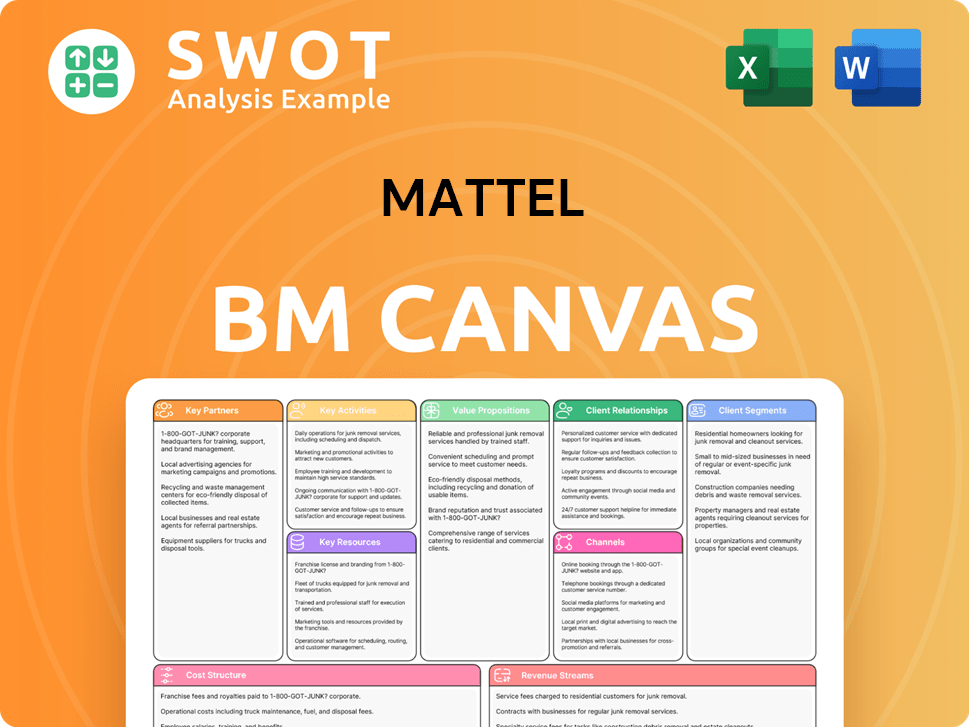
What Are Mission & Vision Improvements?
While Mattel's current statements provide a solid foundation, there's always room for refinement to better reflect the dynamic toy industry and evolving consumer expectations. This chapter explores four key areas where the Mattel Mission and Mattel Vision could be strengthened to ensure continued relevance and success for the Mattel Company.
To enhance its Mattel Philosophy, Mattel could explicitly integrate its commitment to sustainability and inclusion directly into its core mission statement. This would elevate these critical aspects, signaling a stronger dedication to environmentally friendly practices and diverse representation in its products and operations. For instance, the mission could be reframed to explicitly focus on creating inclusive and sustainable play experiences. This aligns with the growing consumer demand for eco-conscious products; a 2024 report by McKinsey shows that 66% of consumers are willing to pay more for sustainable goods.
The Mattel Vision could be improved by explicitly addressing the rapidly evolving digital play landscape. While Mattel is investing in digital transformation, a more forward-looking statement about its role in shaping the future of digital play would be beneficial. This could encompass interactive entertainment, digital content, and virtual experiences, ensuring the company remains relevant in a digitally driven market. Research from Statista indicates the global market for digital toys is projected to reach $20 billion by 2027, highlighting the importance of this shift.
As consumer preferences shift towards purposeful play, the mission and vision could benefit from a stronger emphasis on the developmental and learning aspects of their products. This could include more specific language about the skills and growth Mattel aims to foster in children, aligning with the rising trend of educational toys. This is particularly relevant, as parents increasingly seek toys that offer both entertainment and educational value; a recent study by the NPD Group revealed a 15% increase in sales of educational toys in the last year.
Reviewing and refining the Mattel Core Values to ensure they are clear, actionable, and reflective of the company's current priorities is essential. This includes providing specific examples of how these values are demonstrated in practice. A well-defined set of values helps guide employee behavior and decision-making, contributing to a stronger corporate culture and brand identity. For further insights into Mattel's growth, consider exploring the Growth Strategy of Mattel.
How Does Mattel Implement Corporate Strategy?
The true measure of any company's mission, vision, and core values lies in their practical implementation. Mattel, the iconic toy manufacturer, demonstrates its commitment to these principles through strategic initiatives, leadership, and transparent communication.
Mattel actively implements its Mattel Mission and Mattel Vision through a multi-year strategy focused on expanding its IP-driven toy business and entertainment ventures. This strategy is a direct reflection of its guiding principles, driving growth and innovation across its diverse brand portfolio.
- Brand Portfolio Expansion: Mattel continues to scale its brand portfolio, including iconic brands like Barbie, Hot Wheels, and Fisher-Price, as well as newer acquisitions and collaborations. In 2023, Barbie's revenue increased by 27%, demonstrating the success of this strategy.
- Operational Optimization: The company focuses on optimizing its operations to improve efficiency and reduce costs. This includes streamlining supply chains and leveraging technology to enhance manufacturing processes.
- Content Creation Acceleration: Mattel is accelerating content creation across various platforms, including film, television, and digital media, to enhance brand engagement and revenue streams. The "Barbie" movie, released in 2023, generated over $1.4 billion in global box office revenue, showcasing the power of this approach.
Leadership plays a critical role in reinforcing Mattel's Philosophy and values. Chairman and CEO Ynon Kreiz has consistently emphasized the company's mission and purpose as the foundation for its strategy, empowering the next generation of creators and consumers.
Mattel's compensation programs for senior executives are designed to incentivize behaviors that support its purpose, mission, strategy, and Mattel Core Values. A significant portion of executive compensation is performance-based and at-risk, directly linking executive actions to company performance and the achievement of strategic objectives.
Mattel communicates its mission, vision, and values through various channels, ensuring transparency and stakeholder engagement. This includes investor presentations, corporate reports, and its corporate website, providing accessible information on the company's objectives and performance.
Mattel also communicates its values and purpose through initiatives related to corporate citizenship and workplace culture. The company's commitment to diversity, equity, and inclusion is reflected in its product development and internal programs, fostering a welcoming and inclusive environment.
Mattel demonstrates a strong alignment between its stated values and actual business practices. This commitment is evident in its sustainability efforts, product development, and community engagement initiatives. For a deeper dive into Mattel's marketing approach, consider reading about the Marketing Strategy of Mattel.
- Sustainability Goals: Mattel has made significant progress on its sustainability goals, increasing the use of recycled materials and reducing plastic packaging. By 2023, Mattel had achieved a 40% reduction in plastic packaging per product compared to its 2017 baseline.
- Diversity and Inclusion: The company's commitment to diversity and inclusion is evident in its product development, creating dolls and characters that represent a wider range of children, fostering inclusivity and representation.
- Mattel Playback Program: The Mattel Playback program encourages the recycling of old toys, demonstrating a commitment to circularity and environmental responsibility. The program has collected over 1 million toys since its launch, diverting waste from landfills.
Mattel Porter's Five Forces Analysis
- Covers All 5 Competitive Forces in Detail
- Structured for Consultants, Students, and Founders
- 100% Editable in Microsoft Word & Excel
- Instant Digital Download – Use Immediately
- Compatible with Mac & PC – Fully Unlocked
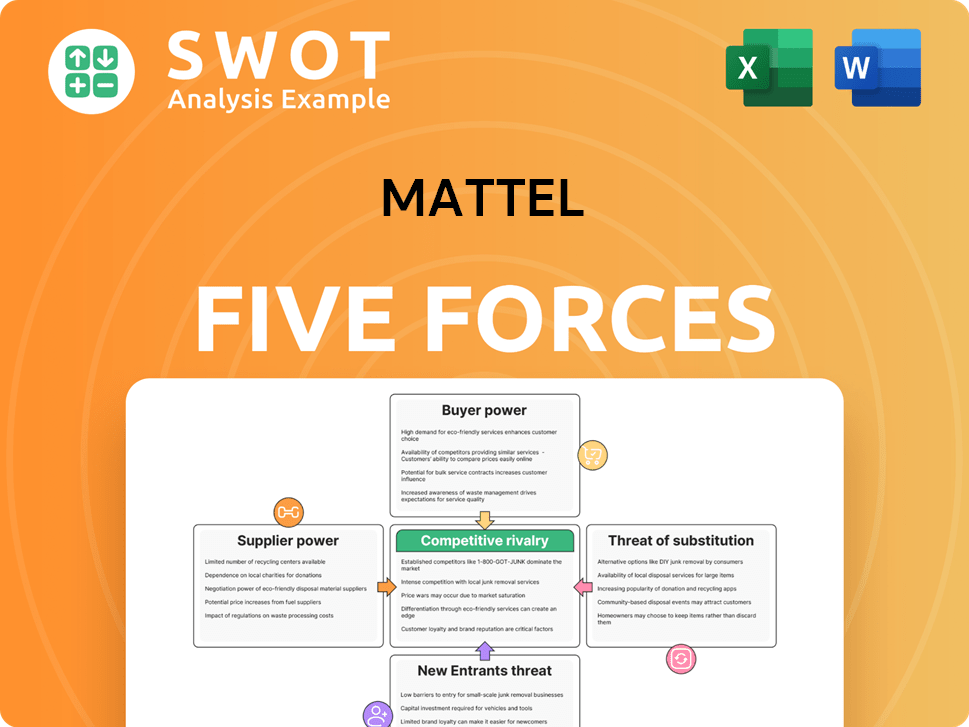
Related Blogs
- What are Mission Vision & Core Values of Mattel Company?
- What is Competitive Landscape of Mattel Company?
- What is Growth Strategy and Future Prospects of Mattel Company?
- How Does Mattel Company Work?
- What is Sales and Marketing Strategy of Mattel Company?
- Who Owns Mattel Company?
- What is Customer Demographics and Target Market of Mattel Company?
Disclaimer
All information, articles, and product details provided on this website are for general informational and educational purposes only. We do not claim any ownership over, nor do we intend to infringe upon, any trademarks, copyrights, logos, brand names, or other intellectual property mentioned or depicted on this site. Such intellectual property remains the property of its respective owners, and any references here are made solely for identification or informational purposes, without implying any affiliation, endorsement, or partnership.
We make no representations or warranties, express or implied, regarding the accuracy, completeness, or suitability of any content or products presented. Nothing on this website should be construed as legal, tax, investment, financial, medical, or other professional advice. In addition, no part of this site—including articles or product references—constitutes a solicitation, recommendation, endorsement, advertisement, or offer to buy or sell any securities, franchises, or other financial instruments, particularly in jurisdictions where such activity would be unlawful.
All content is of a general nature and may not address the specific circumstances of any individual or entity. It is not a substitute for professional advice or services. Any actions you take based on the information provided here are strictly at your own risk. You accept full responsibility for any decisions or outcomes arising from your use of this website and agree to release us from any liability in connection with your use of, or reliance upon, the content or products found herein.